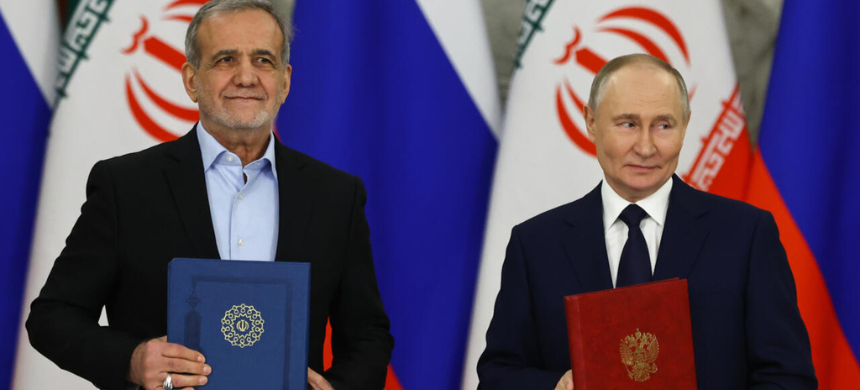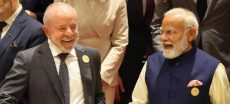Iran and Russia Sign Strategic Partnership Treaty Amid Rising Global Tensions
Moscow, Russia – In a landmark development, Iranian President Masoud Pezeshkian and Russian President Vladimir Putin signed a comprehensive strategic partnership treaty on Friday, signaling deeper cooperation between two heavily sanctioned nations. The treaty, described by both leaders as a “breakthrough,” spans multiple areas, including politics, security, trade, transport, and energy, and aims to strengthen their alliance against Western pressure.
At a joint press conference in Moscow, President Putin highlighted the treaty’s importance for fostering the “stable and sustainable development” of Russia, Iran, and the broader region. While specific details of the agreement remain undisclosed, Kremlin officials have indicated that the pact will significantly enhance military-political and trade-economic relations.
A New Chapter in Iranian-Russian Relations
President Pezeshkian hailed the agreement as a “new chapter” in bilateral ties, emphasizing its potential to boost trade and economic collaboration. Both nations have been leveraging their partnership to counteract global isolation, driven by extensive Western sanctions.
Russian Foreign Minister Sergei Lavrov, speaking earlier this week, described the treaty as “constructive in nature”, designed to strengthen the capabilities of Russia, Iran, and their allies worldwide. The partnership builds upon a 2001 agreement that has been periodically renewed, with the new treaty set to remain in force for 20 years.
Expanding Trade and Military Cooperation
Trade between Russia and Iran has surged in recent years, with significant military collaboration drawing global attention. Iran has supplied Russia with advanced military equipment, including Shahed drones, which Western officials and Ukraine claim have been used in Moscow’s ongoing war with Kyiv.
This growing partnership has raised alarms in Western capitals, where leaders view the Tehran-Moscow alliance as a destabilizing force in global geopolitics. Since the start of Russia’s invasion of Ukraine in February 2022, Iran has emerged as a critical ally for the Kremlin, further cementing their shared opposition to US-led policies.
Read More: Vietnam Finalizes Nuclear Agreement with Russia
Putin’s Pivot to New Alliances
The treaty underscores President Putin’s broader strategy to strengthen ties with nations like Iran, China, and North Korea, challenging US-led “global hegemony.” For Tehran, the agreement aligns with its ambitions to expand its influence amid mounting Western pressure.
The timing is particularly significant for Iran, which has faced foreign policy setbacks, including the collapse of President Bashar al-Assad’s regime in Syria—a key Iranian ally—and the weakening of Hezbollah following its conflict with Israel. The treaty also comes as US President-elect Donald Trump prepares to take office, heightening concerns about renewed confrontations with Iran.
US-Iran Tensions Loom
Trump, known for his hardline stance against Tehran, withdrew from the 2015 Iran nuclear deal during his first term and has repeatedly vowed to counter Iran’s influence in the Middle East. His history of confrontational policies, including the assassination of Qasem Soleimani in 2020, suggests the treaty could further exacerbate US-Iran and US-Russia relations.
With the Tehran-Moscow alliance growing stronger, the agreement underscores a shifting global order, setting the stage for intensified geopolitical competition in the years to come.











